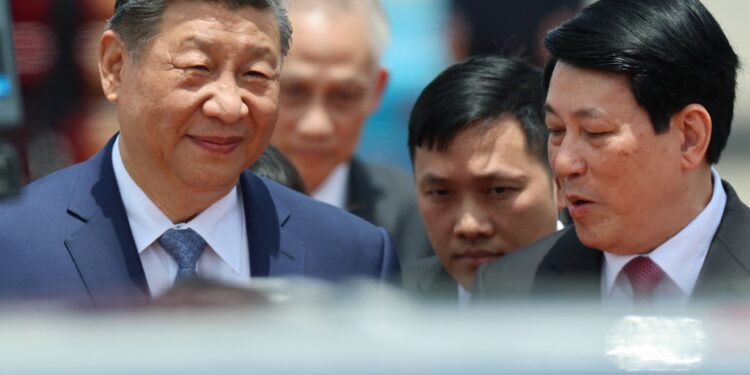Chinese President Xi Jinping condemned the fever that “does not lead to anywhere” at the beginning of his tour today in Southeast Asia aimed at strengthening his country’s commercial relations in the midst of a customs war with the United States.
He stressed that “a commercial war and customs duties will not result in any winner, and the protectionist does not lead to any result.” According to what was reported by the official Chinese news agency.
Xi Jinping arrived on Monday in Vietnam, the first station in his tour, which includes Malaysia and Cambodia as well.
The tour aims to compensate for the heavy customs duties imposed by US President Donald Trump on Chinese products.
The Chinese president will meet his three counterparts in these Asian East countries during the tour that “wears major importance” in the region, according to Beijing.
His visit aims to make China appear as a reliable and stable partner, unlike the United States, which launched a commercial attack in all directions by imposing new customs duties even on its big trading partners.
The Chinese president in the Vietnamese newspaper “Nan Dan” wrote, “Our two countries must maintain firmly on the multilateral trade system, the stability of global industry and supply chains, and an international openness and cooperation environment,” according to the official Chinese news agency.
Evidence of links
American customs duties were imposed on Chinese products by 145% with exceptions. This procedure has shook the global markets and paid Beijing to respond with customs duties of 125%.
Southeast Asia is a basic market for Chinese exports. Last year, the Association of Southeast Asian Countries (ASEAN) was its main destination with goods worth $ 586.5 billion, according to Chinese customs data.
Among these countries is Vietnam, which imports Chinese goods worth $ 161.9 billion, followed by Malaysia, with $ 101.5 billion.
The strengthening of ties with neighboring countries in Southeast Asia, Beijing, may help in facing the repercussions of the United States’s trade campaign, the largest importer of Chinese products in 2024, which amounted to $ 438.9 billion, an increase of 2.8% over the previous year.
She is scheduled to visit Xi Jinping Vietnam tomorrow, Tuesday. The country, which is run by a Communist party, has long been adopted by “Bamboo Diplomacy”, which is based on maintaining good relations with Beijing and Washington at the same time.
Beijing and Hanoi holds close economic relations. But the relationship suffers from disputes in the South China Sea in the Paraceel archipelago, where China is calling for sovereignty over the vast majority of the small islands in the South China Sea in the face of other countries overlooking it, the Philippines, Vietnam, Brunei and Malaysia, which also have its demands.
After Vietnam, Chinese President Malaysia will visit Tuesday to Thursday.
The Malaysian Minister of Communication, Fahmy Fadil, said that the Chinese president’s visit “falls within the framework of government initiatives (…) to improve trade relations with different countries, including China.”
Xi Jinping then heads to Cambodia, the fixed partner of China in Southeast Asia.



